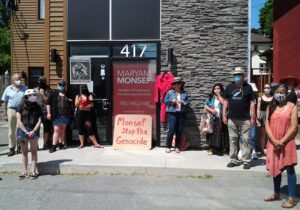Lynn Gehl calls for practice, no rhetoric

By Melodie McCullough
Calling for “practice, not rhetoric”, Lynn Gehl, an Algonquin Anishinaabekwe writer and advocate, urged the federal government at a recent Nogojiwanong (Peterborough) rally. She particularly called upon the Honourable Maryam Monsef to immediately act upon the 231 Calls for Justice laid out in the year-old Reclaiming Power and Place: The Final Report of the National Inquiry into Missing and Murdered Indigenous Women and Girls (MMIWG).
Monsef is the federal Minister of Women and Gender Equality, and is the Member of Parliament for Peterborough-Kawartha.
In a 1,200-page Final Report released June 3, 2019, MMIWG inquiry commissioners concluded Indigenous women and girls are the victims of genocide in Canada. The federal government had promised to release a National Action Plan this month, but that has now been delayed.
“June 3 was the one-year anniversary of the Report and there’s been no action on the part of the Liberal government,” said Gehl, a Nogojiwanong resident, in an interview after the rally. “This whole lack of action means the government continues the genocide. Maryam Monsef is the voice at the Cabinet table and she’s my Member of Parliament. I just want her to make a difference and since she’s at the table, she’s our avenue.”
“We’ve been asking Canada to address the genocide for a long time. It has a responsibility to all women and girls across the country,” she continued. “A focus on how a national plan will serve Indigenous women and girls and their families across the country is needed.”
Gehl suggested that such a plan could include guaranteed funding for Indigenous women’s organizations; transportation from rural to urban locations; assistance with Indian status registration; and special measures for women and girls with disabilities who experience higher rates of sexual violence.
Ziysah, a Nogojiwanong settler (who asked that only their first name be used), was one of the close to 50 Indigenous people and settlers who attended the rally.
“I think the most important work for us here on Turtle Island is to address the ongoing colonization and genocide that Canada is built upon,” they told Anishinabek News. “As a descendent of Jewish refugees, I am deeply grateful every day for the First Peoples of the lands my family fled to, and believe it is our responsibility to redress the ongoing injustices our freedom is built upon.”
“Beginning to implement the 231 recommendations of the MMIWG2S inquiry would be the least our government can do,” they continued. “I am grateful that the Minister for Gender and Women’s Equality has a deep and personal understanding of oppression and has had the opportunity to learn from many Indigenous knowledge holders and leaders. She must make the issue of Missing and Murdered Indigenous Women, Girls and Two-Spirit people one of her very top priorities.”
The website of the Honourable Carolyn Bennett, Minister of Crown-Indigenous Relations, says the government is still consulting with Indigenous women’s groups, Indigenous leadership and provincial and territorial governments on the co-development of a national plan, even though the pandemic has prevented in-person meetings.
In a statement, her office said it has begun implementing the Calls to Justice and so far, has addressed reform of the Child and Family Services System; passed legislation to protect Indigenous languages; eliminated gender discrimination in the Indian Act; toughened criminal laws in cases of domestic assault; provided health and support services to survivors and families of MMIWG, including LGBTQ and Two-Spirit people; and supported a review of police policies and practices.
“We are ensuring that we get this right for the survivors, families and loved ones, to honour the spirits and memories of those lost, and to protect future generations. We are focused on that work,” the statement said.
But Lorraine Whitman, president of the Native Women’s Association of Canada (NWAC), disagrees.
“Instead of a National Action Plan, we are left with a lack-of-action plan,” she said in a June 3 news release.
NWAC recently compiled a report card of the government’s progress on the Calls for Justice, looking at four areas connected to the violence – culture, health, security, and the right to justice. In each category, it gave a failing grade.
NWAC also presented the federal government with a list of proposed measures that could be the founding basis for a National Action Plan, Whitman said.
“Frankly, the Minister’s explanation that there has not been enough consultation to draft a first National Action Plan simply does not hold water,” she said. “They had nine months before the pandemic hit to reach out to us and other Indigenous groups. But I can tell you that NWAC did not hear much from them during that time… In May, with this anniversary day drawing near, there had been no requests for input from Minister Bennett’s office regarding what should go into a National Action Plan.”

